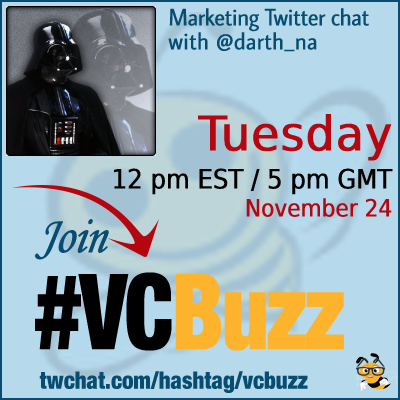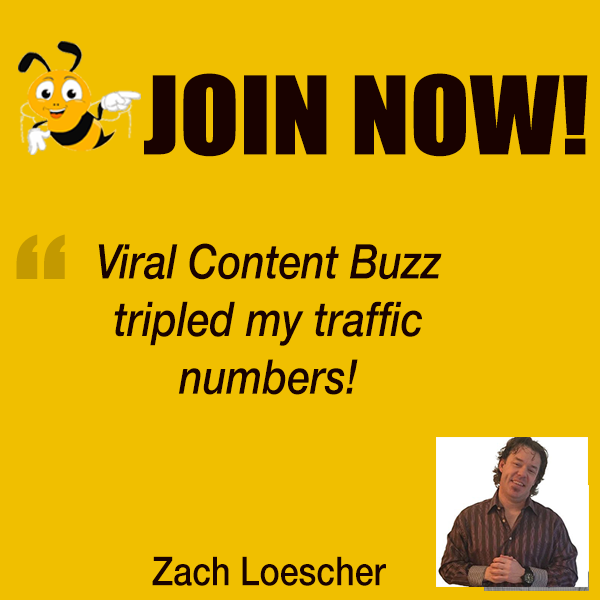
SEO industry is quite probably the most misleading one.
There’s so much FUD (is this abbreviation still a thing?)
When you try solving an SEO mystery, you are likely to come across quite a few conflicting (and often dangerous) theories.
At some point you are bound to feel helpless.
How to find real SEO advice? Let’s discuss.
***Add #VCBuzz chats to your calendar here.
***Please sign in here to follow the chat -> twchat.com/hashtag/vcbuzz
About Lyndon NA @darth_na
Lyndon NA @darth_na is an SEO and usability expert.
Lyndon is a former Google Webmaster forums top contributor.
Questions we discussed
Q1 How did you become a digital marketer? Please share your career story!
I accidentally stepped in to it. I originally started off in web-design … but realised that not only was SEO important, a fair bit of it could (should!) be handled by the web designer/developer. So started learning SEO.
After a time, I found myself applying “sales tricks” and sales-psychology to wording, suggesting methods to get attention, planning out content and promotion etc. And I’m still doing today.
@vcbuzz A1. I got an awesome collaboration with an #inbound marketing agency. They turned me from a content writer into a marketer. And that was it 🙂 #vcbuzz
— Teodora Ema Pirciu (@emapirciu) November 24, 2020
A1. In 2010, I was looking for a job as a developer, but couldn't find one.
— Praveen Sharma (@MusingPraveen) November 24, 2020
Then a friend introduced to SEO. I gave multiple interviews, got rejected in all.
Then learned basics of SEO at a small agency for 6 months without pay.
Finally got my first job after that.#vcbuzz
Q2 When a website owner is looking for answers to a specific SEO question, how can they tell a myth from an actually useful piece of advice?
Unfortunately – they can’t 🙁 It’s a difficult and complicated problem. Some stuff is wrong, and always was. Some things are wrong now, but were right “then”. There are ideas/hypothesis presented/read as actualities/facts.
A2) Case studies are a good way to look into what someone has theorised *and* has put into practice. It provides a lot more clarity than just a piece of advice without anything to back it up. #vcbuzz
— Itamar Blauer (@ItamarBlauer) November 24, 2020
Then there’s hyperbole and attention getters, where “truth” and “accuracy” aren’t really a consideration. Plenty of pages out there lack dates. Some people intentionally alter dates 🙁
I’m currently setting up my author website. You’re touching on many of the points that are driving me crazy. I don’t want to rely on an undated post for technical information. #vcbuzz
— Dana Lemaster (@DanaLemaster) November 24, 2020
A2 research an answer to SEO to see what others more knowledgeable in SEO are saying #vcbuzz
— Alison Wolf | Work At Home Mom | Freelance Writer (@freelancerboss) November 24, 2020
Many searchers/readers don’t check dates, or realise they can search with date-filters But the biggest issue of all is … if you don’t know the answer, it’s hard to find it, especially when there’s so many pages competing for your attention.
A2 @darth_na not to mention new "buzz word" creators who claim to start a new trend. This always causes so much confusion #vcbuzz
— Ann Smarty (@seosmarty) November 24, 2020
So – you have to learn to gauge things. Look at different sources, use a bit of judgement, and start noting which sources seem to be right more often. The more you learn, the easier it gets to discern “probable” from “unlikely” or “not quite right”.
A1. How to spot an SEO Myth vs solid advice:
— Jeannie Hill (@essentialskill) November 24, 2020
♦️ Do your own research
♦️ Follow influencers
♦️ Stay current w/ Google announcements
♦️ Given the strong connection between search ranking & CTR, going for 1st position ranking isn't the best end goal. https://t.co/6exC3ugJfX #vcbuzz https://t.co/RibjYwRR6a
A2. Listen to sources you know and trust. Don’t rely on one source, and check results over time. Myths don’t tend to hold up, but reliable advice generally will. #vcbuzz
— Dana Lemaster (@DanaLemaster) November 24, 2020
A2. SEO myths SEO professionals fall for:
— Jeannie Hill (@essentialskill) November 24, 2020
?SEO is expensive
?SEO is dead
?Any business owner can do their own SEO
? SEO hasn't changed much#vcbuzz
Q3 What are some most ridiculous SEO myths even old-time SEO professionals seem to believe in?
Good question – and I don’t have an answer. I honestly cannot think of any specific thing that the more experienced SEO’s believe that I know to be wrong. But that leaves us with “SEOs in general” and “miscomprehensions”.
A3. A truly experienced SEO is typically beyond this. Draggers may be in the area of Keywords related myths and still dabbling too deep in Black Hat SEO. #vcbuzz
— Jeannie Hill (@essentialskill) November 24, 2020
There’s no shortage of myths out there, and some of them last a long time because of glory-seekers and parrots (both are a bane in the SEO Sector 🙁 ). So things like “Google loves long form content” go on for years.
Various authors on a given topic tend to link to the content pieces that they authored. Naturally, they know them best and are vested there. #vcbuzz
— Jeannie Hill (@essentialskill) November 24, 2020
But the more complex one is misconceptions and miscomprehensions. When you look at the “long form content” myth – with a little experience/knowledge, you can see it’s a flawed idea. But to few bothered to look deeper, and look at other factors.
A3 @darth_na people claiming you need to "save Page Rank" by nofollowing all internal links but those that matter for SEO…. #vcbuzz
— Ann Smarty (@seosmarty) November 24, 2020
Things like “keyword density”, or, more accurately, “breadth of topic/theme coverage” (various related terms pertaining to each other) got ignored, and the simplistic idea of “word count” got opted for.
Most of the ones I hear are about keyword density, TF-IDF craziness, internal linking structures, social signals don't matter, E-A-T is just a fad….#vcbuzz
— Sam (@DigitalSamIAm) November 24, 2020
Q4 What are some good online places to learn SEO?
Tough question – as there’s no shortage of places. Personally, I’m biased (and spoiled) – Google’s Webmaster Forums is one of the best places to look. Everyday, real people (site/business owners, Webdesigners and SEOs) post their issues.
A4 @Moz is where I started and it is still solid (albeit comment section is pretty useless but main content is usually spot-on). There are questionable things covered from time to time but they are always careful in stating that's not conformed… #vcbuzz
— Ann Smarty (@seosmarty) November 24, 2020
My personal favourite is Googles own Docs and Blog. Their FAQs and of course, the Google Guidelines and then there’s the Search Quality Raters Guide.
All are solid for learning at various levels. Then there’s sites like Moz, Ahrefs, SEMRush etc. – all provide various resources and insights, and well worth peoples time.
I used to read the Marketing Pilgrim a lot when I first started (gone now), but another one I used to read was HoboWeb.
But all of them require time to read and think over, else you may end up misunderstand things (and many do). It’s also important to remember that “our words” and “Googles words” are not always the same. The sense/meaning can/does vary.
@darth_na @hobo_web is an old friend! Another one that always backs up everything with solid research is @glenngabe #vcbuzz
— Ann Smarty (@seosmarty) November 24, 2020
Love Glenn! And, to be fair, I’m a fan of @lilyraynyc for the same reason – lots of thought and research!
Q5 What are your favorite SEO tools?
100% – Search Console! Though I could live without it – some of the data there is more than valuable. Pair it with tracking data from things like Analytics/Matomo/SnowPlow etc., and you can get some serious insights.
A5 Google Analytics, Google Search Console, @Ahrefs, @textoptimizer… RT @vcbuzz: Q5 What are your favorite SEO tools? #vcbuzz
— Ann Smarty (@seosmarty) November 24, 2020
Then there’s things like SpyFu, SEMRush, Ahrefs … but I think the tools I use the most are:
- My brain
- PHP + MySQL
- Spreadsheets (GDocs / MS Office etc.)
- Post it notes
- Server access logs too!
- Google SERPs (see what searchers see)
Our previous SEO chats:
- How to Recover After Losing Rankings in Google’s Core Algorithm Updates with @WilliamAlvarez
- Enterprise SEO Process and Strategy with Jordan Silton @jsilton
- How to Win Against Biggest Brands in SEO with @HamletBatista
- SEO Entities and Google’s NLP with @KrystianSzastok
- How to Claim and Optimize Your Personal Google Knowledge Graph with Don Sturgill @DonSturgill
- How to Monitor Your Rankings with @MordyOberstein of @rankranger
- Schema for Content Marketers with Martha van Berkel with @marthavanberkel
- SEO Ranking Factors with Paul Baguley @BaguleyPaul
- How SEO Has Changed with Deborah Norton @BRAVOMedia1
- SEO Then and SEO Now with Bonnie Burns @Burnsie_SEO



